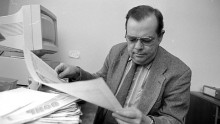The newspaper Den awards the James Mace Prize for Civic Attitude in Political Journalism annually on the Holodomor anniversary memorial day. The prize is conferred on the authors of new political journalism publications that encourage people to uphold their historical memory and national identity and promote recognition of the 1932-1933 manmade famine as genocide of the Ukrainians. It will be recalled that the prize was founded by Den’s editor-in-chief Larysa IVSHYNA and is now being awarded for the sixth consecutive year. “James Mace saw that the 20th century had not yet fully got rid of fear. And he advised not to speak to the world of today from the position of a victim, for it is a futile thing to do. Instead, it is necessary to ‘get restored’ quickly, heal the wounds, educate journalists, work with society, become competitive, and, at the same time, cherish the memory of the Ukrainian people’s most devastating disaster in the past century. Therefore, our prize symbolizes a certain continuity of this process: thinking, positions…” Ms. Ivshyna points out.
In the previous years, the prize winners were Den’s well-known political journalists and contributors Ihor LOSIEV, Ihor SIUNDIUKOV, Serhii HRABOVSKY, and Oleksandr PALII. Last year two authors – Petro KRALIUK and Volodymyr BOIKO – shared this honorary award. “It was difficult to say which of the two candidatures could outweigh the other. They are modern-day intellectuals,” Ms. Ivshyna said at the award ceremony.
Who is going to win the prestigious award this year? All the more so that the prize is being awarded at a difficult time for Ukraine: we honor the memory of the victims of the Holodomor, one of the gravest catastrophes in the history of Ukraine, and remember such no less dramatic events as the Maidan and the war in the country’s east. What assumes special significance in this historical context is civic attitude, the prize’s basic principle.
“James Mace’s heritage not only does not lose, but gains, importance as years go by – especially today, when the war unleashed by Russian occupiers is going on. Mace always called upon the Ukrainians to resist occupiers. His precepts about the Holodomor and the resistance the Ukrainians used to put up to it are, unfortunately, topical again. I am very glad that the James Mace Prize continues to exist and will be soon awarded for the sixth 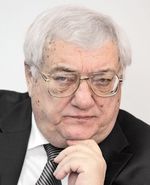 time,” Yurii SHCHERBAK, writer, diplomat, chair of the James Mace Prize public board, said on the eve of this year’s award ceremony. “In my view, we should look for candidates who most adequately describe the current events in Ukraine, our struggle against the occupiers, and what is going on at the seized territories. I hope the worthiest one will be the winner, all the more so that all his or her predecessors brilliantly lived up to this exalted title. Take, for example, articles by Ihor Losiev and Serhii Hrabovsky. This is a pearl in the crown of not only the newspaper Den, but also Ukrainian political writing as a whole. I think the James Mace Prize is now one of the most important national awards. It is not only recognition of today’s merits, but also encouragement for a person who works in the name of Ukraine.”
time,” Yurii SHCHERBAK, writer, diplomat, chair of the James Mace Prize public board, said on the eve of this year’s award ceremony. “In my view, we should look for candidates who most adequately describe the current events in Ukraine, our struggle against the occupiers, and what is going on at the seized territories. I hope the worthiest one will be the winner, all the more so that all his or her predecessors brilliantly lived up to this exalted title. Take, for example, articles by Ihor Losiev and Serhii Hrabovsky. This is a pearl in the crown of not only the newspaper Den, but also Ukrainian political writing as a whole. I think the James Mace Prize is now one of the most important national awards. It is not only recognition of today’s merits, but also encouragement for a person who works in the name of Ukraine.”
The name of this year’s laureate will be announced on November 18 at 4 p.m., when the contest’s public board will be having a ceremonial session at Den’s editorial office.
Those invited to the event are Yurii Shcherbak, writer, Ambassador Extraordinary and Plenipotentiary of Ukraine, chairman of the contest’s public board; Oleh Nalyvaiko, chairman of the League of Ukrainian Journalists; Stanislav Kulchytsky, professor, Doctor of History, head of the Department of Ukraine’s 1920s-1930s History at the Institute of Ukrainian History; Natalia Dziubenko-Mace, writer, widow of James Mace; and the previous prize winners.
On the eve of the award ceremony, members of the contest’s public board and the previous prize winners shared with Den their opinions about James Mace’s political writing heritage and the importance of this national award.
Oleh NALYVAIKO, chairman, State Television and Radio Committee; member of the James Mace Prize public board:
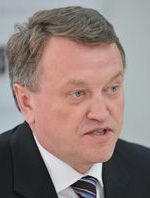 “There are a lot of various prizes, titles, and contests in the media sphere. Among them are one-off affairs and instances of honoring the tradition. But, for sixth consecutive year, the James Mace Prize for Civic Attitude in Political Journalism has been occupying a separate rung on the ladder to professional journalistic acclaim. The point is that the exalted title of laureate is determined not only by professional criteria, but also by the nominee’s own civic attitude, contribution to the strength of our people, and cementation of the civic foundation of all that allowed our people to hold out and win during the Revolution of Dignity and still allows them to heroically defend their native land in the east.
“There are a lot of various prizes, titles, and contests in the media sphere. Among them are one-off affairs and instances of honoring the tradition. But, for sixth consecutive year, the James Mace Prize for Civic Attitude in Political Journalism has been occupying a separate rung on the ladder to professional journalistic acclaim. The point is that the exalted title of laureate is determined not only by professional criteria, but also by the nominee’s own civic attitude, contribution to the strength of our people, and cementation of the civic foundation of all that allowed our people to hold out and win during the Revolution of Dignity and still allows them to heroically defend their native land in the east.
“I am sure that next in the illustrious line of James Mace Prize winners will be one more patriot and intellectual. I am looking forward to the board’s decision.
“On behalf of the State Television and Radio Committee, I’d like to thank Ms. Larysa Ivshyna and Den journalists for a major contribution to the preservation of our people’s historical memory, patriotic education of young people, and personal civic attitude.”
Natalia DZIUBENKO-MACE, writer, journalist, member of the James Mace Prize public board:
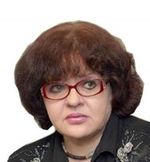 “Awarding the James Mace Prize is a special event for me. It is always my personal celebration. This means a larger number of James Mace’s brethren and comrades in a common destiny, in a joint struggle for a new, democratic, rich, and strong Ukraine. Today, as never before, when the soul of every Ukrainian is undergoing an endurance test, we need James’ voice, presence and lucidity of mind, mature political thinking, and political analysis. We are facing a difficult choice today, for the newspaper has turned lately into sort of an intellectual Maidan, an unusual laboratory, where new statesmanlike approaches are being tested and the invaluable crystals of the truth are being faceted in acute polemic clashes. The newspaper has acquired a number of new brilliant political journalists. I am sure this prize will be awarded today to the worthiest ones, to those who possess the uncommon talent of political writing, who have found their personal civic attitude on the painful and difficult roads of passionate search and work.
“Awarding the James Mace Prize is a special event for me. It is always my personal celebration. This means a larger number of James Mace’s brethren and comrades in a common destiny, in a joint struggle for a new, democratic, rich, and strong Ukraine. Today, as never before, when the soul of every Ukrainian is undergoing an endurance test, we need James’ voice, presence and lucidity of mind, mature political thinking, and political analysis. We are facing a difficult choice today, for the newspaper has turned lately into sort of an intellectual Maidan, an unusual laboratory, where new statesmanlike approaches are being tested and the invaluable crystals of the truth are being faceted in acute polemic clashes. The newspaper has acquired a number of new brilliant political journalists. I am sure this prize will be awarded today to the worthiest ones, to those who possess the uncommon talent of political writing, who have found their personal civic attitude on the painful and difficult roads of passionate search and work.
“It is extremely important that this prize is being awarded on the eve of a nationwide remembrance of the tragic 1932-1933 Holodomor, to the study of which the American academic with a Ukrainian heart devoted his lifetime. He always considered this event as a pivotal point in Ukrainian history, as a source of most of the present-day troubles in Ukrainian society. It is the post-genocidal condition that led to the total lobotomy of historical memory and reduced the level of spirituality. As a result, this brought forth people who do not know their roots in their native land as well as rampant corruption in all the spheres of life. The Holodomor was a war crime of sorts against Ukraine, while hushing up and falsifying it is a crime against the Ukraine of tomorrow. Only the truth and the clear awareness of its scale, causes and ends will take us out of the ‘red idol’s vicious circle.’ This was the main direction of Mace’s research and is the central theme of publications by the best Ukrainian political journalists in my favorite newspaper Den.”
Stanislav KULCHYTSKY, Doctor of History, member of the James Mace Prize public board:
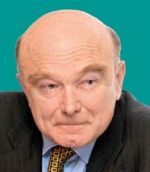 “President Poroshenko recently signed a decree on marking the 81st anniversary of the Holodomor. At first glance, it does not almost differ from a similar decree of Yanukovych, but there is still a difference – the latter did not comprise the word ‘genocide.’ Poroshenko did what the president was supposed to do, for the Verkhovna Rada classified the Holodomor as genocide of the Ukrainian people as long ago as 2006. This is a matter of principle. It is not about laying claims to the present-day Russian Federation, for we can lay claims to it for entirely different reasons. Still, there should be clarity in this matter, as it is in the history of the Holocaust. We must make efforts today to cause other countries to understand this, too. It is James Mace to whom Ukraine owes, to a considerable extent, progress in this direction. Unfortunately, a major part of his heritage has not yet been published – it is kept in the Kyiv Mohyla Academy’s archive. Yet the Ukrainian reader can get acquainted with Mace’s attitudes thanks to materials published by the newspaper Den. After Mace’s death, a lot of researchers managed to continue his quest – also on the basis of the archives to which he had no access – and prove documentarily that the Holodomor was nothing but genocide. It is wonderful that the newspaper Den pays a good deal of attention to Ukrainian history. I think this year’s James Mace Prize should be awarded to an author who managed to give the best portrayal of what is going on at the front.”
“President Poroshenko recently signed a decree on marking the 81st anniversary of the Holodomor. At first glance, it does not almost differ from a similar decree of Yanukovych, but there is still a difference – the latter did not comprise the word ‘genocide.’ Poroshenko did what the president was supposed to do, for the Verkhovna Rada classified the Holodomor as genocide of the Ukrainian people as long ago as 2006. This is a matter of principle. It is not about laying claims to the present-day Russian Federation, for we can lay claims to it for entirely different reasons. Still, there should be clarity in this matter, as it is in the history of the Holocaust. We must make efforts today to cause other countries to understand this, too. It is James Mace to whom Ukraine owes, to a considerable extent, progress in this direction. Unfortunately, a major part of his heritage has not yet been published – it is kept in the Kyiv Mohyla Academy’s archive. Yet the Ukrainian reader can get acquainted with Mace’s attitudes thanks to materials published by the newspaper Den. After Mace’s death, a lot of researchers managed to continue his quest – also on the basis of the archives to which he had no access – and prove documentarily that the Holodomor was nothing but genocide. It is wonderful that the newspaper Den pays a good deal of attention to Ukrainian history. I think this year’s James Mace Prize should be awarded to an author who managed to give the best portrayal of what is going on at the front.”
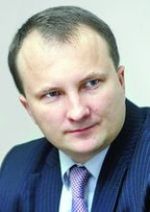 Oleksandr PALII, political journalist, James Mace Prize winner:
Oleksandr PALII, political journalist, James Mace Prize winner:
“James Mace’s heritage is extremely topical today. It allows one to profoundly reconsider and overcome national traumas by means of a scientific method but also with great passion, which adds energy.
“His political writing is based on a good Western school, i.e., it has a high, often almost unattainable, rationale. But, at the same time, there is a great deal of motivation for sympathy.
This kind of political writing really strikes you through. Apart from general knowledge, there is one more thing there – a very deep look into the root of the matter.”
Ihor SIUNDIUKOV, editor of “History and I” section, James Mace Prize winner:
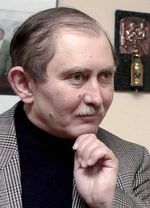 “Sometimes simple, at first glance, and quite transparent questions pave the way to profound and long reflections, to a search for not at all obvious responses to dramatic challenges which life itself issues to each of us and to society. For example, the question ‘Why do you think the James Mace Prize and the heritage of this outstanding person, a brilliant political writer, a prominent historian, a humanist, and a citizen remains topical today?’ is more than serious, for it exposes the essential features of our existence.
“Sometimes simple, at first glance, and quite transparent questions pave the way to profound and long reflections, to a search for not at all obvious responses to dramatic challenges which life itself issues to each of us and to society. For example, the question ‘Why do you think the James Mace Prize and the heritage of this outstanding person, a brilliant political writer, a prominent historian, a humanist, and a citizen remains topical today?’ is more than serious, for it exposes the essential features of our existence.
“The James Mace Prize is awarded for a civic attitude which the laureate took (and, ideally, defended) in journalistic works on the dramatic problems of Ukrainian national history and the present day. This obviously raises the question: and what is a civic attitude, after all? Can a journalist take one – now in a stern year of war? I will tersely express a few opinions. In this writer’s view, the components of a civic attitude are as follows: 1) clarity of opinions, assessments, and views (for too many Ukrainian journalists are inclined to take an amorphous position in a wrong style, such as ‘on the one hand, we cannot but admit, but, on the other hand, we must say’; in other words, a spade must be called a spade without any slyness: surrender is surrender, high-flown demagogical talk is high-flown talk, war is war, enemies are enemies, not ‘partners’); 2) responsibility for each fact and each printed byte of information. We say freedom of the press should be untouchable. This is a thousand times right! But let us be honest and add to this: like any other professional, a journalist (particularly a political one) has no right to evade responsibility for the result of their work. Can the ignorant self-confidence (moreover, deliberate lies) of a journalist be justified by referring to the ‘freedom of the press’? And, finally, 3) a civic attitude is a wise and courageous sobriety rather than an aspiration to see (in history, in the present, in the future) what you ‘wish to believe in so much.’ This propensity to sweet illusions is baneful for us. James Mace always wrote honestly, courageously, soberly, and wisely about both the past and the present. Let it be a model for us.
“2014 has proved to be such a year in Ukrainian history that it perhaps goes without saying that it is important for each of us to take a civic attitude. This is just a condition without which a person is unable to keep their identity intact and will decay. For even Ancient Orient sages used to say: ‘If I am not for myself, who will be for me? But if I am only for myself, what am I? And if not now, when?’ How many myths have been exploded, how many mindless ‘Berlin Walls’ demolished, how many false ‘authorities’ brought down! And how many priceless lives have been given for Ukraine! We seem to have changed this country beyond recognition in the past 12 years, but, let us be sober, things are not so simple – the past, including what we would like to get rid of, is not somewhere else, it is inside us…
“I am convinced that the James Mace Prize 2014 winner will be worthy of his high award which has already earned well-deserved respect in Ukraine. The prize expert group will select the really best candidature – a person with a biting pen in hand and Ukraine in heart, with unbreakable courage and sober illusion-free way of thinking. Political writers like this undoubtedly exist. The year 2014 (let me say it again: unusual and crucial for the nation) has shown who is who.”
Volodymyr BOIKO, historian, political journalist, James Mace Prize winner, Chernihiv:
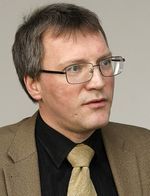 “James Mace showed an open, public, unconventional (for a post-Soviet person), sometimes even outlandish, way of life – from the angle of that time’s ideas of an academic, professor, and political writer. And the point is not only in that he wanted to prove something to somebody: Mace really had some scholarly ideas without which he could not imagine himself, but in his everyday life, too, the researcher was unwilling to adjust to the surrounding circumstances, creating an original world of his own. Later, Mace became part of the world outlook of those he was in touch with. He may not have been consciously striving for this, but he could not help it – otherwise, he would not have been Mace. The impression is he could not help sacrificing himself. It was something like teenage sincerity in an adult experienced man.
“James Mace showed an open, public, unconventional (for a post-Soviet person), sometimes even outlandish, way of life – from the angle of that time’s ideas of an academic, professor, and political writer. And the point is not only in that he wanted to prove something to somebody: Mace really had some scholarly ideas without which he could not imagine himself, but in his everyday life, too, the researcher was unwilling to adjust to the surrounding circumstances, creating an original world of his own. Later, Mace became part of the world outlook of those he was in touch with. He may not have been consciously striving for this, but he could not help it – otherwise, he would not have been Mace. The impression is he could not help sacrificing himself. It was something like teenage sincerity in an adult experienced man.
“In this case, Mace’s civic attitude was an organic continuation of his human essence. It is perhaps about the best of the possible combinations. This is what Ukraine lacked so much and what so many aspired for, each in their own way. So we can assert that the past year’s events in Ukraine are sort of a search for justice and humanness for which Mace aspired individually. He became one of particular stimulants of active citizenship in the country where he lived and which he loved through his personal pain. So, the James Mace Prize from the newspaper Den is not only the reminder of him personally, but also simulation of a certain behavioral style of a free person and citizen.”
Ihor LOSIEV, political journalist, James Mace Prize winner:
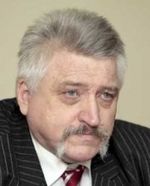 “James Mace and the prize named after him will always be topical for Ukraine – above all, in the field of political journalism, for this prize is very important for the preservation of moral and ethic standards in our profession. There have been many attempts lately under the flag of unbiased and impartial journalism to recognize morality in this sphere. Mace gave the example of combining impeccable academism with a biased and moral attitude to problems. He showed that you can remain an academic who meets all the requirements of scientific proof search and, at the same time, be personally concerned about the truth, as befits a moral person. This is what we ought to learn from him today and later. We are living in a world, where its fate depends on the attitude of millions of people to events. Any impartiality enables evil forces to triumph on Earth.
“James Mace and the prize named after him will always be topical for Ukraine – above all, in the field of political journalism, for this prize is very important for the preservation of moral and ethic standards in our profession. There have been many attempts lately under the flag of unbiased and impartial journalism to recognize morality in this sphere. Mace gave the example of combining impeccable academism with a biased and moral attitude to problems. He showed that you can remain an academic who meets all the requirements of scientific proof search and, at the same time, be personally concerned about the truth, as befits a moral person. This is what we ought to learn from him today and later. We are living in a world, where its fate depends on the attitude of millions of people to events. Any impartiality enables evil forces to triumph on Earth.
“A political journalist without a civic stand is not a professional but a performer of the informational function.
“I must note that the award commission has made not a single mistake. All the winners proved to be not only worthy, but also industrious people who are still working actively and, what is more, with high quality, in our media space. They display interest in and concern about what is going on and adequately appraise these processes, also on the pages of Den.”
Serhii HRABOVSKY, political journalist, James Mace Prize winner:
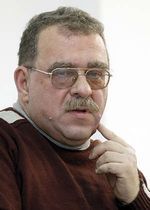 “In my view, it would be very good if James Mace’s publications and ideas were interesting not only to professional historians. For this would mean that Ukraine managed to overcome its postcolonial and post-genocidal legacy and a totally new national elite has emerged on the basis of a free community of free citizens, and that there is no more danger of an imperialist revenge from a well-known state – be it the ‘red’ or the ‘liberal’ imperialism, of which Mace wrote, or the latest, neo-Stalinist, imperialism of the ‘Russian World’ which formed after the death of James. But I am afraid Professor Mace’s ideological heritage will remain topical for a long time – not in the least because the factors he wrote about 15 years ago still continue to exist: ‘The tragedy of independent Ukraine is that the territorial, rather than the national elite became the dominant force, its members retaining all the hallmarks of the traditional nomenklatura (think one thing, say another, and do yet a third). The actual Ukrainian economic model remains triangular. This triangle was discernible even in the 1970s: corrupt members of the nomenklatura – illegal entrepreneurs – criminal organizations.’
“In my view, it would be very good if James Mace’s publications and ideas were interesting not only to professional historians. For this would mean that Ukraine managed to overcome its postcolonial and post-genocidal legacy and a totally new national elite has emerged on the basis of a free community of free citizens, and that there is no more danger of an imperialist revenge from a well-known state – be it the ‘red’ or the ‘liberal’ imperialism, of which Mace wrote, or the latest, neo-Stalinist, imperialism of the ‘Russian World’ which formed after the death of James. But I am afraid Professor Mace’s ideological heritage will remain topical for a long time – not in the least because the factors he wrote about 15 years ago still continue to exist: ‘The tragedy of independent Ukraine is that the territorial, rather than the national elite became the dominant force, its members retaining all the hallmarks of the traditional nomenklatura (think one thing, say another, and do yet a third). The actual Ukrainian economic model remains triangular. This triangle was discernible even in the 1970s: corrupt members of the nomenklatura – illegal entrepreneurs – criminal organizations.’
“The communist system as such collapsed long ago, but its traditions are still alive and being upheld, in particular, by those who were formed in the years of restored independence. The key economic sectors and the vast majority of the political beau monde still remain within the triangle Prof. Mace described. Naturally, the current government cardinally differs for the better from the criminal regime of the ‘golden bread loaf’ [Yanukovych. – Ed.], but it does not seem to be willing to destroy once and for all the triangle which was established as long ago as the 1970s and became the core of the oligarchic system during Kuchma’s presidency.
“This means that James Mace’s cause, to which he devoted all his lifetime, is still far from being completed. Yet some intermediate stages have been passed – sociologists claim that even in the previous decade the majority of Ukrainian citizens accepted the classification of the Holodomor as a crime against the people committed by the then authorities. The Revolution of Dignity allayed post-genocidal fear in millions of people, the fear that had been passed from generation to generation on a subconscious level. Today, in the Donbas, the military, many of whom have not perhaps even heard of Mace, are promoting his cause with arms in hand, fighting against the red-brown imperial monster bent on staging a new act of genocide against the ‘ukrops’ [ethnic slur. – Ed.] so that Ukraine vanish into thin air.
“But, in spite of everything, I am sure that James Mace’s soul and good deeds will remain with all of us, with Ukraine, even when the problems he described cease to be topical at last and just become a matter of academic interest. The point is that, in addition to the professional and political aspect, there is also a, so to speak, ‘all-human format’ of somebody’s actions. In this sense, those who knew him personally, those who only read his articles or heard his lectures, those who have not even heard the name ‘Mace’ but are resisting the brand-new Russian imperialism with weapons in hand or as part of volunteer units, and those who sincerely aspire to introduce the new rules of the game in the political milieu, still do and will always harbor a fraction of James’ heart.”
Petro KRALIUK, philosopher, James Mace Prize winner:
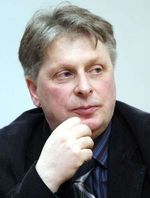 “Texts do not live long, especially in our era of informatics. And very few texts outlive their authors. James Mace’s texts have survived their ‘father.’ I hope they will live a long life, at least here in Ukraine. He was one of the first to broach the question of the Ukrainian Holodomor. And not only that… He showed what consequences this manmade famine had, and still has, for Ukrainian society.
“Texts do not live long, especially in our era of informatics. And very few texts outlive their authors. James Mace’s texts have survived their ‘father.’ I hope they will live a long life, at least here in Ukraine. He was one of the first to broach the question of the Ukrainian Holodomor. And not only that… He showed what consequences this manmade famine had, and still has, for Ukrainian society.
“A lot of Mace’s opinions still remain topical – especially about the specifics and problems of Ukrainian society. For example, it is worthwhile to reflect on his words that ‘today’s Ukraine is essentially distinct from the typical European nation-state arising out of such a national movement’ and that it ‘will continue to swing between the European and Asian spaces.’ It seems, though, that the pendulum has essentially swung towards Europe in the last while – but not as radically as we expected.
“We often blame leaders for our troubles, forgetting that we are also to partially blame for these troubles and that we all create the circumstances in which our leaders act. In this context, it is also worthwhile to heed the following words of James Mace: ‘The problem is not at all bad leaders making the wrong decisions. Anyone who has ever had even minimal contact with the political process in any country will confirm that a politician is not at all a free man. He has only limited freedom of maneuver within the context of those forces capable of blocking, restricting, or forcing that politician’s decisions.’ I believe the Ukrainians should look into, not just read, James Mace’s texts. Then we will perhaps be wiser and avoid a series of mistakes.”

